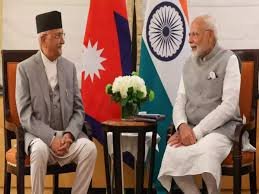India and Nepal Strengthen Scientific Ties with New Agreement
India and Nepal Sign Landmark Scientific Agreement
India and Nepal have taken a significant step in enhancing their scientific cooperation by signing a new agreement aimed at fostering collaboration in research and technology. The agreement, signed between India’s Council of Scientific and Industrial Research (CSIR) and Nepal Academy of Science and Technology (NAST), will focus on joint research projects, technology transfer, and knowledge exchange. This development strengthens the longstanding partnership between the two neighboring countries and highlights the growing importance of science and innovation in bilateral relations.
Key Areas of Collaboration Under the Agreement
The scientific agreement will facilitate collaboration in various fields, including biotechnology, environmental sciences, nanotechnology, and renewable energy. Scientists and researchers from both countries will work together on projects that address regional challenges such as climate change, water resource management, and sustainable agriculture. The partnership aims to enhance research capabilities and technological advancements in both nations.
Impact on Education and Research
The agreement is expected to benefit academic institutions, researchers, and students in India and Nepal. It will enable knowledge sharing through joint workshops, seminars, and research programs. This initiative will open new avenues for students aspiring to pursue careers in science and technology while providing exposure to international research opportunities.
Technology Transfer and Industrial Growth
The agreement also includes provisions for technology transfer between the two nations, which could significantly boost industrial and economic development. Nepal, which is seeking to expand its technological infrastructure, will benefit from India’s expertise in various fields of science and technology. This will promote innovation and entrepreneurial opportunities in both countries.
Strengthening Bilateral Relations Beyond Science
Beyond the realm of scientific collaboration, this agreement strengthens overall diplomatic and trade relations between India and Nepal. By working together on scientific advancements, the two countries can build mutual trust and understanding, paving the way for deeper cooperation in other strategic areas such as trade, infrastructure, and defense.

Why This News is Important
Enhancing India-Nepal Relations
The agreement signifies a new milestone in India-Nepal relations, reinforcing their commitment to cooperative growth. It not only strengthens scientific collaboration but also enhances diplomatic ties, ensuring long-term partnerships in various sectors.
Boosting Research and Innovation
This partnership will help both nations leverage each other’s expertise in scientific research. It promotes knowledge sharing and technological advancements, which can lead to new discoveries in key fields such as medicine, agriculture, and environmental science.
Encouraging Academic and Student Exchange
By fostering joint research initiatives and student exchange programs, the agreement will provide educational benefits, encouraging young scientists to engage in international research and innovation.
Economic and Technological Benefits
Technology transfer and industrial collaboration will create economic opportunities in both nations. Nepal, in particular, will gain from India’s scientific progress, which can accelerate its own technological advancements.
Addressing Regional Challenges
Joint research efforts will help both countries tackle shared challenges such as climate change, sustainable energy, and natural disaster management, benefiting the entire South Asian region.
Historical Context
India-Nepal Relations in Science and Technology
India and Nepal have a history of collaboration in science and technology dating back to the 1950s. Over the decades, various agreements and programs have been initiated to promote research and knowledge exchange between the two nations.
Previous Bilateral Agreements
India and Nepal have signed multiple agreements covering trade, education, health, and technology. The Indo-Nepal Science & Technology Cooperation Program has been instrumental in fostering research collaboration between universities and research institutions in both countries.
Regional Scientific Cooperation in South Asia
South Asian nations have been increasingly focusing on scientific cooperation to address common challenges. India has played a leading role in promoting regional research initiatives, such as SAARC (South Asian Association for Regional Cooperation) projects in science and technology.
Key Takeaways from India-Nepal Scientific Agreement
| S. No. | Key Takeaway |
|---|---|
| 1 | India and Nepal signed a new agreement to strengthen scientific collaboration. |
| 2 | The partnership will focus on biotechnology, environmental science, nanotechnology, and renewable energy. |
| 3 | Academic institutions and researchers will benefit through joint research and student exchange programs. |
| 4 | Technology transfer from India will boost Nepal’s industrial and economic development. |
| 5 | This agreement reinforces overall diplomatic relations and paves the way for further bilateral cooperation. |
Important FAQs for Students from this News
1. What is the purpose of the India-Nepal scientific agreement?
The agreement aims to strengthen scientific collaboration, promote joint research, and facilitate technology transfer between the two countries.
2. Which institutions are involved in the agreement?
India’s Council of Scientific and Industrial Research (CSIR) and Nepal Academy of Science and Technology (NAST) are the primary organizations involved.
3. How will students benefit from this agreement?
Students and researchers will have opportunities for academic exchanges, joint research projects, and exposure to international scientific advancements.
4. What are the key focus areas of the collaboration?
The partnership will focus on biotechnology, nanotechnology, environmental science, renewable energy, and other key scientific fields.
5. How does this agreement impact India-Nepal diplomatic relations?
It strengthens diplomatic ties by fostering mutual cooperation in science and technology, which can lead to further partnerships in other areas.
Some Important Current Affairs Links

















